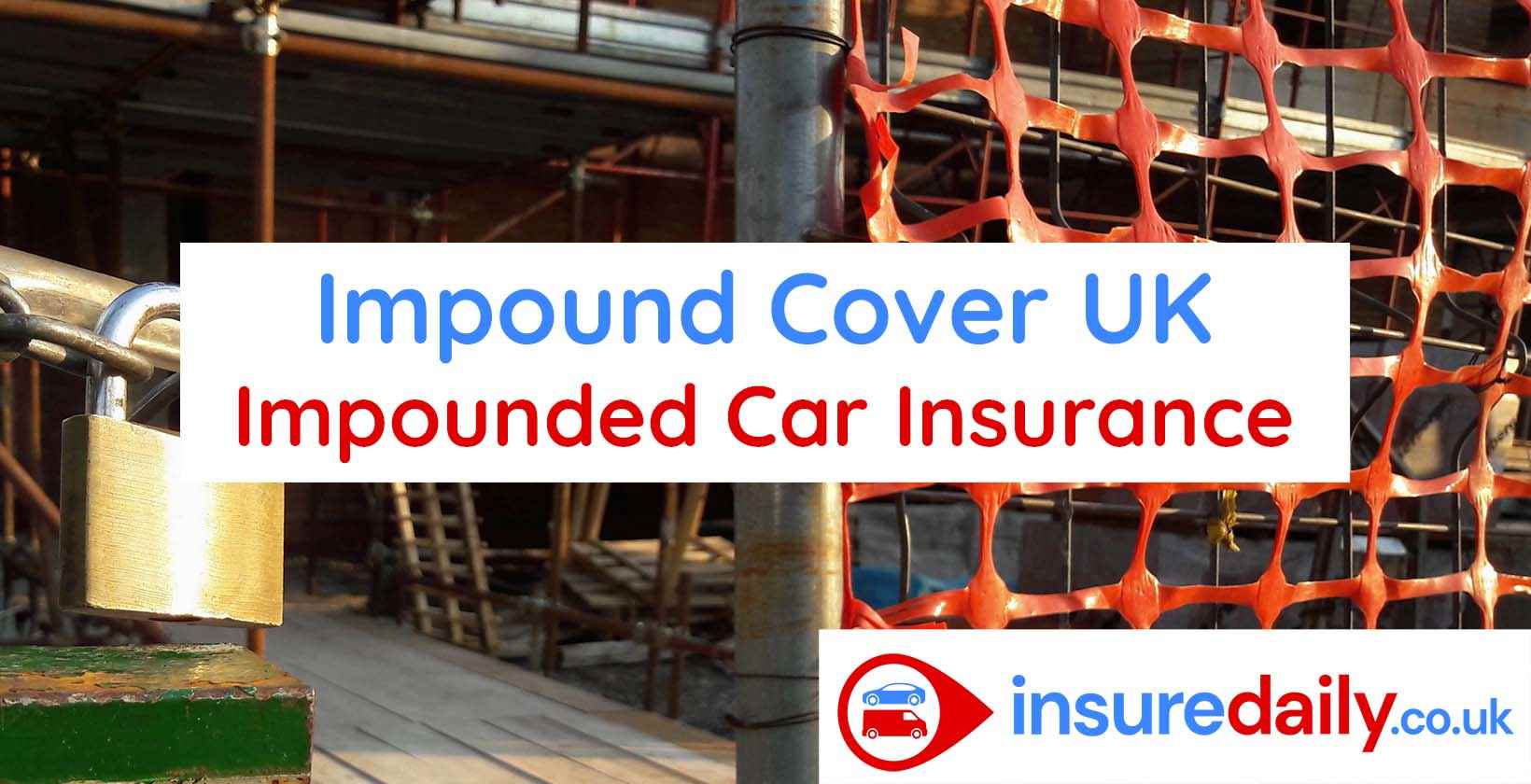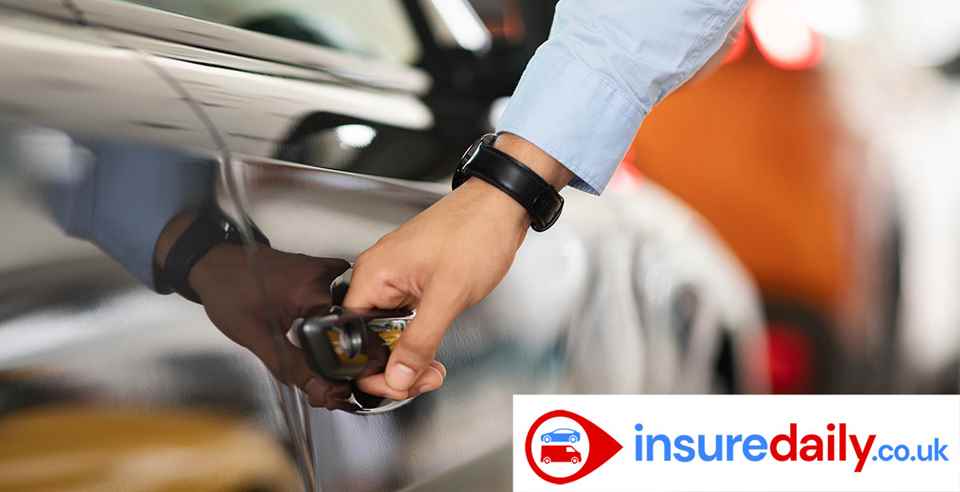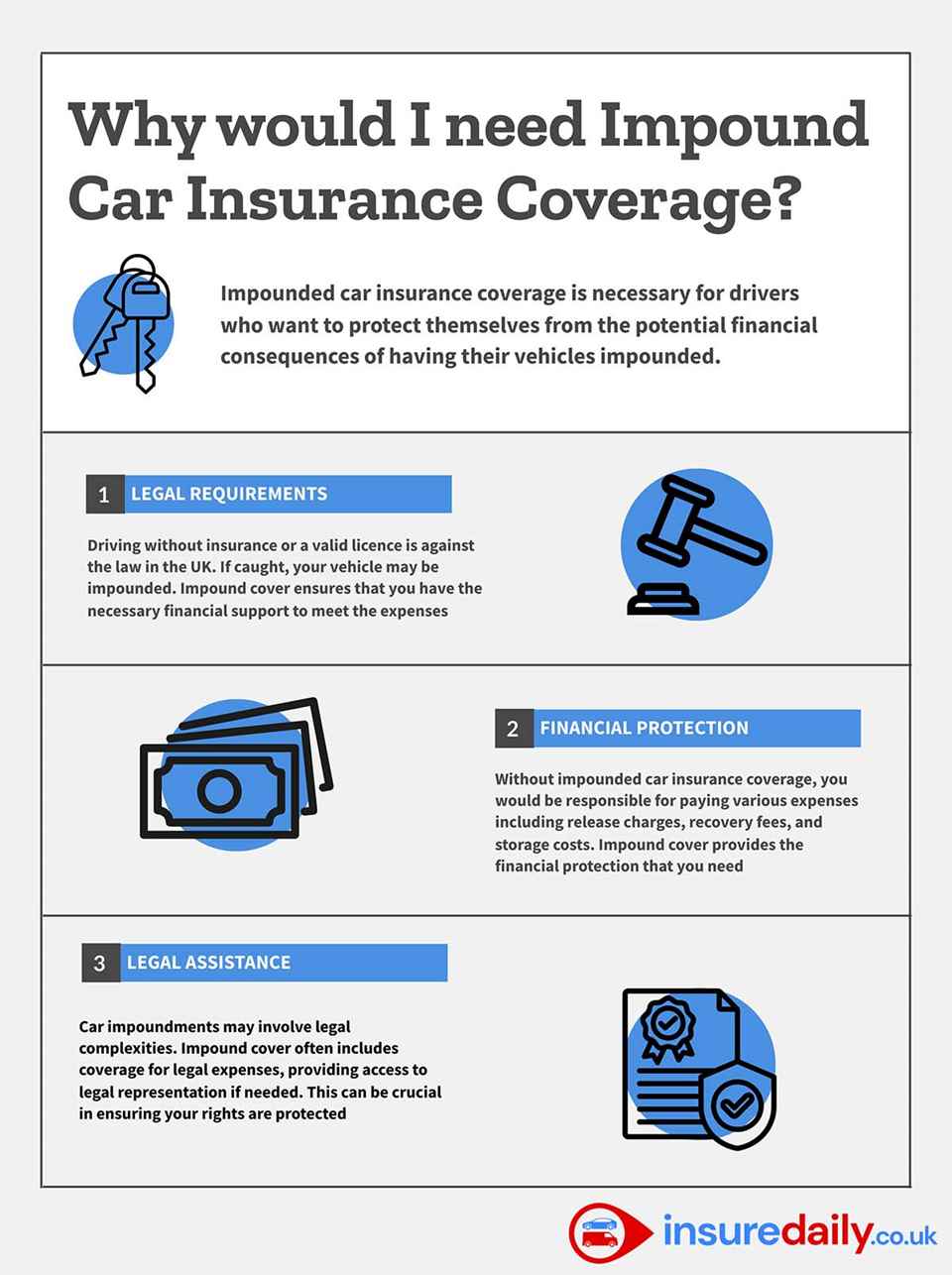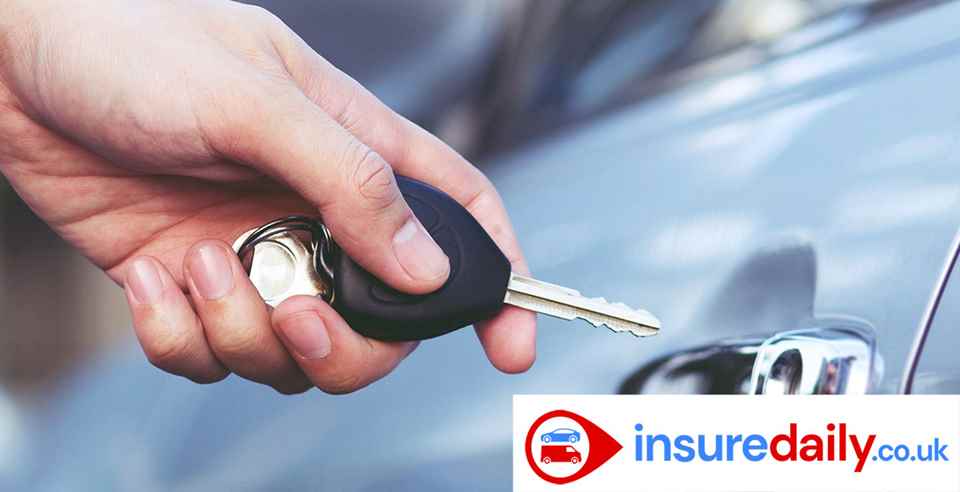Impound Cover UK: Impounded Car Insurance

Impound car insurance in the UK is a temporary policy designed to cover the minimum 30 days required to release an impounded vehicle. It provides necessary insurance coverage to comply with legal requirements and allows individuals to retrieve their impounded vehicle within the specified time frame. Impound cover is often required for drivers who have been impounded due to driving without insurance, such as being caught driving without insurance. It is not a long-term insurance solution and does not provide comprehensive coverage typically associated with regular car insurance policies. Impound coverage covers third-party liability, impound release, legal compliance, and road use. It is not a long-term insurance solution and is not intended to provide comprehensive coverage.
Impounded car insurance in the UK has limitations and exclusions, including commuting, business use, additional drivers, pre-existing damage, extended time periods, damage caused by negligence, car modifications, and exporting the car. However, it offers benefits such as legal compliance, vehicle release, temporary coverage, convenience, and peace of mind. Downsides include limited policy options, limited coverage, exclusions, and costs. Impounded car insurance can be obtained through research, contact, and application. Factors contributing to impounded vehicles include driving without valid insurance, unpaid road tax, unlicensed drivers, parking violations, abandonment, criminal activities, unroadworthy or unsafe vehicles, failure to comply with impoundment orders, and serious traffic offences.
To obtain impounded car insurance cover, research insurers, contact them, provide required information, receive insurance quotes, choose a policy, complete the application and payment, and obtain proof of insurance. If the impounded car is not collected within a specified period, it may be disposed of by the authorities.
To release a car from impounding, follow these steps: contact the impound lot, gather required documents, settle outstanding fees, provide proof of compliance, schedule a vehicle inspection, and retrieve the vehicle. The cost of impound insurance varies depending on factors like age, driving history, type of car, annual mileage, postcode, occupation, voluntary excess, and type of cover. Younger drivers, those with a poor driving history, and those living in high-crime areas pay more for impound insurance. Temporary car insurance policies can be obtained for impounded cars, but they cannot be standard. In the UK, a car can be impounded for having no insurance, which can result in a fixed penalty notice, six penalty points, court proceedings, and imprisonment. To avoid penalties and fees, contact an insurance broker or insurer as soon as possible.

Getting a car impounded can negatively impact your car insurance policy, as it may demonstrate irresponsibility to insurers and increase premiums. Impound insurance is a temporary policy designed for retrieving impounded vehicles, providing temporary coverage for 30 days. Standard car insurance policies typically do not include specific provisions for impounding-related expenses or retrieval. To ensure compliance with legal requirements and facilitate the release of the impounded car, it is recommended to obtain separate impound car insurance. Common types of car insurance in the UK include Third-Party Only (TPO), Third-Party, Fire and Theft (TPFT), Comprehensive Insurance, Telematics (Black Box), and Pay-as-You-Go (PAYG) insurance. Consult insurance companies directly to understand specific details and coverage options.
What Does Impound Cover Mean in the UK?
An impounded car is a driver’s vehicle that has been confiscated by the government or the police. Cars being seized can occur when cars have been found to have been involved in illegal activities or have broken certain rules. Common reasons for impounding a car include traffic violations, unpaid parking tickets, being used in criminal activity, or driving without valid insurance. Being caught driving without insurance is the most common reason for vehicle impoundment in the UK.
Impound car insurance cover in the UK refers to a temporary insurance policy that allows drivers to insure and subsequently remove their impounded vehicle from the impound. This form of insurance is specifically designed to cover a period of 30 days, which is the minimum requirement to release the vehicle.
Impound cover provides the necessary insurance coverage to comply with legal requirements and allows individuals to retrieve their impounded vehicle within the specified time frame. Impound Insurance in the UK is sometimes also referred to as Compound Insurance.
How Does Impound Cover Work?
When a vehicle is impounded, typically due to driving without insurance, the owner needs to obtain impound cover to retrieve their car. They can contact an insurance provider specialising in impound car insurance and purchase a temporary policy for a specific duration, in this case 30 days.
Once the impound cover is in place, the individual can present the necessary documentation to the authorities or impound facility. This includes proof of impound cover, valid driver's licence, and any other required documents. Once the impound release fees are paid, the person is granted permission to remove their impounded vehicle.
During the coverage period, impound cover provides the necessary insurance protection required by law. InsureDaily only offers Third-Party Only (TPO) cover on Impound coverage policies. It ensures that the driver of the impounded vehicle is insured against potential damages or accidents involving third parties while the vehicle is being driven or transported to its intended destination.
It is important to note that impound cover is temporary and should not be confused with regular, long-term car insurance. It serves the specific purpose of enabling individuals to comply with legal requirements and retrieve their impounded vehicle within the mandated time frame.
Why Would I Need Impound Car Insurance Coverage?
You will only need to purchase Impound Car Insurance Coverage if your car has been impounded. The most common reasons for a car being impounded are:
- A car reported as stolen is found by police
- A car is illegally parked or blocking access
- A car is being used for crime or linked to a reported crime
- A car is driven by someone without the correct cover to drive it
- A car is not properly taxed or insured
Drivers in the UK must have valid insurance coverage in order to legally drive on public roads. Driving without insurance is against the law, breaking this law exposes drivers to financial risks and responsibility in the event of an accident or damage. If a car is impounded as a result of driving without insurance, the driver must obtain impound car insurance coverage to meet the legal requirements for releasing an impounded car. Without this coverage, a driver will not be able to retrieve their vehicle from the impound lot.
Impound car insurance offers the temporary coverage required to meet your legal responsibilities and release your impounded vehicle from the impound lot. Impound coverage ensures that the car is insured during the collection and transportation process to your intended destination. By purchasing impound car insurance, you demonstrate your commitment to following the law and accepting financial responsibility for your vehicle. It enables you to correct the issue, meet the insurance requirements, and reclaim ownership of your impounded vehicle.

Can Motorcycles Have Impounded Insurance Coverage?
Yes - Motorcycles can have Impound coverage. An individual can take out an impound policy on a motorcycle in largely the same way as they would take out the policy on an impounded car. Motorcycle impound insurance coverage is a form of motorcycle insurance that provides temporary protection for motorbike owners who need to retrieve their impounded vehicles from impounds.
Similar to impounded car insurance, this coverage allows owners to meet the legal requirements and demonstrate financial responsibility for their impounded vehicle. This policy ensures that the driver holds proper insurance during the motorcycle retrieval and transportation process, allowing owners to comply with the law and regain possession within the specified timeframes. Impounded insurance coverage is a solution for those impounded due to lack of insurance, ensuring a smooth release of their impounded vehicle.
What Does Impound Car Insurance Cover?
The coverage provided by impound car insurance is temporary and specific to the impounded period. It is not a long-term insurance solution and does not provide the comprehensive coverage typically associated with regular car insurance policies.

Impound car insurance in the UK is a temporary insurance policy that specifically covers the minimum required period of 30 days to retrieve the impounded vehicle. Its primary purpose is to meet the legal requirements for releasing the impounded car. As such, impound car insurance typically offers the following coverage:
- Third-Party Liability: InsureDaily’s Impound car insurance provides coverage for third-party liability. This means it covers the costs associated with injury, death, or property damage caused to others as a result of an accident involving the impounded vehicle.
- Impound Release: Impound car insurance enables the release of the impounded vehicle by fulfilling the insurance requirement set by the impound authorities.
- Legal Compliance: Impound car insurance ensures that you have the necessary insurance coverage as mandated by law to drive and remove your impounded vehicle from the impound lot. It satisfies the legal obligation of having 30 days’ valid insurance coverage while driving the impounded vehicle and facilitates its release from the impound lot.
- Road Use: It provides temporary insurance coverage for the impounded vehicle, allowing it to be driven legally on the road during the retrieval process and for social, domestic & pleasure driving within the 30 day period.
Impound car insurance has a specific and limited scope of coverage. It is designed to facilitate the lawful retrieval of the impounded vehicle and it ends after the 30 days of the policy expires.
What Does Impound Car Insurance Not Cover?
Impound car insurance in the UK has limitations and exclusions. Here are some common examples of what impound car insurance typically does not cover:
- Commuting, Business Use, or Hire or Reward Driving: The policy only covers social, domestic, and pleasure driving during the 30-day impound period. It does not extend to commuting, business activities, or hire or reward driving like taxi services.
- Additional Drivers: Impound car insurance is usually limited to the named policyholder and does not allow for additional drivers to be added to the coverage.
- Pre-existing Damage: Impound car insurance is focused on the retrieval period and does not cover pre-existing damages or issues with the impounded vehicle.
- Extended Time Periods: The coverage is strictly limited to the required 30-day minimum for impound release and does not extend beyond this timeframe.
- Damage Caused by Negligence: Impound car insurance does not cover damages caused by negligence or reckless driving.
- Car Modifications: Modifications made to the impounded vehicle may not be covered by impound car insurance.
- Exporting the Car: Impound car insurance is typically limited to the UK and does not cover exporting the impounded vehicle to another country.
What are the Benefits of Impounded Car Insurance?
Here are the key benefits of impounded car insurance:
- Legal Compliance: Impounded car insurance ensures that you meet the legal requirements for driving and retrieving an impounded vehicle. It helps you avoid legal penalties and potential fines.
- Vehicle Release: With impounded car insurance, you can successfully retrieve your impounded vehicle from the impound lot, allowing you to regain possession and use of your car within the mandated time frame.
- Temporary Coverage: Impounded car insurance provides temporary coverage specifically designed for the minimum required period of 30 days to retrieve the impounded vehicle. It offers a short-term solution to fulfil the insurance obligation. You can still drive the vehicle within this 30 day period after release from the impound, provided that it is for social, domestic & pleasure driving.
- Convenience: Impounded car insurance offers a streamlined process for obtaining insurance coverage specifically for impounded vehicles, minimising the hassle and time required to meet the legal requirements and retrieve your car.
- Peace of Mind: By having impounded car insurance, you can have peace of mind knowing that you are compliant with the law and have the necessary coverage to legally retrieve and drive your impounded vehicle.
What are the Downsides of Impounded Car Insurance?
Here are some of the potential downsides of impounded car insurance:
- Limited Policy Options: Impounded car insurance may have fewer policy options available compared to regular car insurance, as it serves a specific and temporary purpose.
- Limited Coverage: Impounded car insurance provides coverage specifically for the minimum required period of 30 days to retrieve the impounded vehicle. It does not offer the comprehensive coverage typically associated with long-term car insurance policies. Impounded car insurance often provides only Third Party Only (TPO) coverage, which means it covers the liability for damages caused to third parties but does not cover damages to the insured vehicle itself.
- Exclusions and Limitations: Impounded car insurance may have certain exclusions and limitations, such as restrictions on additional drivers and coverage for specific types of use, like commuting or business purposes.
- Cost Considerations: Depending on the provider and circumstances, impounded car insurance may be relatively more expensive compared to long-term car insurance policies due to the temporary nature of the coverage. This is still often cheaper than the costs associated with longer term impoundment however.
What are the Possible Reasons for a Car Being Impounded?
Impoundment of a vehicle on UK roads can be as a result of various factors. Some of these factors include:
- Driving without valid insurance
- Unpaid road tax
- Unlicensed drivers
- Parking violations
- Abandonment or neglect
- Involvement in criminal activities
- Unroadworthy or unsafe vehicles
- Failure to comply with impoundment orders
- Serious traffic offences.
These violations can lead to impoundment as a penalty or to ensure public safety. It is crucial to park responsibly and follow parking regulations to avoid impoundment.
How Do I Get Impounded Car Insurance Cover?
To obtain impounded car insurance cover in the UK, follow these steps:
- Research insurance providers: Start by researching reputable insurers that offer impounded car insurance in the UK. One such insurer is InsureDaily.
- Contact them: Reach out to selected providers by phone or through their website, providing details about your impounded vehicle, such as registration number, make, model, and impound location.
- Provide required information: Provide personal information, including your name, address, contact details, and driving history
- Receive insurance quotes: The insurance provider will assess your situation and provide tailored quotes based on factors like impound duration, vehicle condition, and previous driving offences.
- Choose a policy: Review the quotes and select the policy that best suits your needs and budget.
- Complete the application and payment: Provide accurate information and make the necessary payment to secure impounded car insurance coverage.
- Obtain proof of insurance: After the application process is complete and payment is made, the insurance provider will issue a certificate or policy document as proof of impounded car insurance coverage.
Note that the specific steps and requirements may vary slightly depending on the insurance provider and individual circumstances. Always communicate directly with the insurance company for detailed guidance and to address any specific questions or concerns.
What if I am Not the Registered Owner of the Impounded Car I am Driving?
The process of collecting an impounded car for a non-registered keeper can be complex, as the keeper is responsible for providing necessary documents and paying charges.
Only the registered keeper or a nominated representative can collect the vehicle on their behalf. In exceptional circumstances, the registered keeper may be excused from appearing in person, such as being not in the UK, in hospital or prison, or unable to attend due to age, injury, or disability. In this case they can nominate a representative.
It is crucial to check with the police or impound authorities for specific details on when and how to collect the impounded car, as they will provide guidance on necessary documentation and additional requirements based on the keeper's circumstances. If the impounded car is not collected within a specified period, typically 14 days, it may be disposed of by the authorities..
What Do I Need to Do to Get a Car Released from Impounding?
To get your car released from impounding, you need to follow these steps:
- Contact the Impound Lot: Reach out to the impound lot where the car is being held as soon as possible. Obtain the necessary information, such as contact details, operating hours, and any specific requirements or documents needed for vehicle release.
- Gather Required Documents: Prepare the documents typically required for releasing an impounded car. These may include proof of ownership (vehicle registration document or logbook), a valid driver's licence, proof of insurance, and any impoundment release forms provided by the authorities.
- Settle Outstanding Fees: In most cases, impounding involves fees that need to be paid before your car can be released. These fees may include towing charges, impound storage fees, and any fines or penalties associated with the impoundment. Ensure you settle all outstanding fees to facilitate the release of your vehicle.
- Provide Proof of Compliance: If there were specific reasons for the impoundment, such as driving without insurance or road tax, you will need to provide proof of compliance with the relevant requirements. This can include obtaining valid insurance coverage or paying outstanding road tax depending on the circumstances.
- Schedule a Vehicle Inspection (if required): In certain cases, the impound lot or authorities may require a vehicle inspection to ensure it is roadworthy and meets all necessary safety requirements. If an inspection is needed, follow the instructions provided and ensure your car has passed the inspection before it can be released.
- Retrieve the Vehicle: Once you have fulfilled all the requirements, contact the impound lot to schedule the retrieval of your car. Make sure to bring all the necessary documents and proof of compliance when you go to pick up your vehicle.
It is essential to note that the specific procedures and requirements for releasing an impounded car may vary depending on the jurisdiction and the reasons for impoundment. Contact the impound lot and relevant authorities for detailed guidance and to address any specific questions or concerns you may have.
How Much Does Impounded Car Insurance Cost?
The cost of impound insurance varies depending on a number of factors. These factors include age, driving history, the type of car, annual mileage, postcode, occupation, voluntary excess, the type of cover, and any criminal convictions.
In general, younger drivers, those with a poor driving history, and drivers who live in high-crime areas will pay more for impound insurance. Drivers with cars that are more expensive to repair or that are more likely to be stolen will also pay more.
Here is a more detailed list of the factors that can affect the cost of impound insurance:
- Age: Younger drivers are generally considered to be at higher risk than older drivers, so they tend to pay more for car insurance.
- Driving history: A driver with a clean driving record, will likely pay less for car insurance than someone who has had accidents or traffic violations.
- The type of car: The make, model, and value of a car can all affect the cost of car insurance. Some cars are more expensive to insure than others, depending on their safety features, repair costs, and theft rate.
- Annual mileage: The more miles driven each year, the higher your car insurance premium will be. This is because a driver is more likely to be involved in an accident if they use their vehicle more often.
- Postcode: Area can also affect the cost of your car insurance. This is because some areas have higher crime rates or more traffic accidents than others.
- Occupation: Some occupations are considered to be higher risk than others, so drivers in these occupations may pay more for car insurance. For example, delivery drivers and taxi drivers are often considered to be at higher risk because they spend a lot of time on the road.
- Voluntary excess: The voluntary excess is the amount an insured party has to pay towards any claim they make. A higher voluntary excess will result in a lower insurance premium.
- The type of cover: The type of cover will also affect the cost of car insurance. For example, comprehensive cover is more expensive than third-party cover.
It is important to shop around and compare quotes from different insurers before buying impound insurance to find the most appropriate policy for you.
Can I Get a Temporary Car Insurance Policy for the Impounded Car?
Yes, you can get a temporary car insurance policy for an impounded car. However, you cannot get a standard temporary insurance policy. You will need to get a specific impound policy, which is a type of temporary insurance that is specially designed for cars that have been impounded.
Impound policies are typically valid for 30 days. This is because most impound yards require that you have at least 30 days of insurance before they will release your car. If you need to get your car out of impound, you will need to purchase an impound policy.
Can a Car Be Impounded For Having No Insurance?
Yes, a car can be impounded for having no insurance. This is the most common reason for a car being impounded in the UK. The law requires all drivers in the UK to have car insurance. If a driver is caught driving without insurance, they will be issued a fixed penalty notice of £300 and six penalty points. They may also be taken to court, where they could be fined up to £5,000 and disqualified from driving.
In addition to the fine and penalty points, their car may also be impounded. This means that it will be taken to a police pound and they will not be able to get it back until the fine has been paid, insurance has been obtained, and the impound fees have been paid. The impound fees can be significant. They typically include the cost of storing the car, the cost of towing the car to the impound yard, and the cost of administration fees.

If your car is impounded, you will need to contact the impound yard to arrange for its release. You will need to pay the impound fees and provide proof of insurance before your car will be released. If you are caught driving without insurance, you should contact an insurance broker or insurer as soon as possible to obtain insurance. This will help you to avoid the penalties and fees associated with driving without insurance.
Does Getting a Car Impounded Affect Your Car Insurance Policy?
Yes. Getting a car impounded will affect your car insurance policy, and any future car insurance policies that you may wish to take out. Since impoundment will only ever happen as the result of wrongdoing on the part of the driver, this will often demonstrate irresponsibility to an insurer and prove them to be of greater risk; leading to an increase in premiums or denying insurance altogether, as insurers may be hesitant to provide any cover if you had a car impounded prior. These factors vary between individuals and circumstances, but definitely carry a negative impact on your car insurance policy.
Do Car Insurance Policies Already Cover Impounding?
While some car insurance policies may provide coverage for retrieving an impounded car, it is important to note that this is not typically the case. Most standard car insurance policies do not include specific car insurance coverage for impounding situations.
It is crucial to differentiate between the impound insurance discussed throughout this article and the coverage provided by regular car insurance policies. Impound insurance refers to a temporary insurance policy often taken out as a result of impoundment due to uninsured drivers. Its primary purpose is to enable the retrieval of the impounded vehicle and provide temporary coverage for a specified period, usually 30 days.
On the other hand, standard car insurance policies are designed to provide coverage for various risks, such as accidents, theft, and damage. However, they do not typically include specific provisions for impounding-related expenses or impound retrieval.
If your car insurance policy does not explicitly mention impound coverage, it is unlikely that it will cover the costs associated with retrieving an impounded vehicle. In such cases, obtaining separate impound car insurance is recommended to ensure compliance with legal requirements and facilitate the release of the impounded car. It is essential to review the terms and conditions of your specific car insurance policy or consult with your insurance provider to confirm whether impound-related expenses are covered.
What are the Different Types of Car Insurance?
In the UK, various types of car insurance policies are available to suit different needs. Here are some common types:
- Third-Party Only (TPO) Insurance: This is the minimum legal requirement for driving in the UK. It covers liability for injuries to other people and damage to their property caused by your vehicle, but does not cover damage to your own car.
- Third-Party, Fire and Theft (TPFT) Insurance: In addition to the coverage provided by TPO insurance, TPFT insurance also covers theft of your vehicle or damage caused by fire.
- Comprehensive Insurance: This is the most extensive form of car insurance coverage. It includes third-party liability protection, as well as coverage for damage to your own vehicle, regardless of fault. Comprehensive insurance also offers additional features such as windscreen cover and personal accident benefits.
- Telematics (Black Box) Insurance: This type of insurance involves using a telematics device or smartphone app to monitor your driving behaviour. It can provide personalised premiums based on your driving habits, potentially resulting in lower insurance costs for safe drivers.
- Pay-as-You-Go (PAYG) Insurance: PAYG insurance, also known as usage-based insurance, calculates premiums based on the distance you drive or the time spent driving. It can be beneficial for occasional or low-mileage drivers who want more flexible coverage.
- Impound Car Insurance: Impound car insurance is a temporary insurance policy specifically designed for retrieving impounded vehicles. It provides coverage for a limited period, typically 30 days, allowing you to remove your car from the impound lot and ensure legal compliance.
It's important to note that these are general categories of car insurance in the UK, and policies may vary between insurance providers. It's advisable to consult with insurance companies directly to understand the specific details and coverage options they offer.

